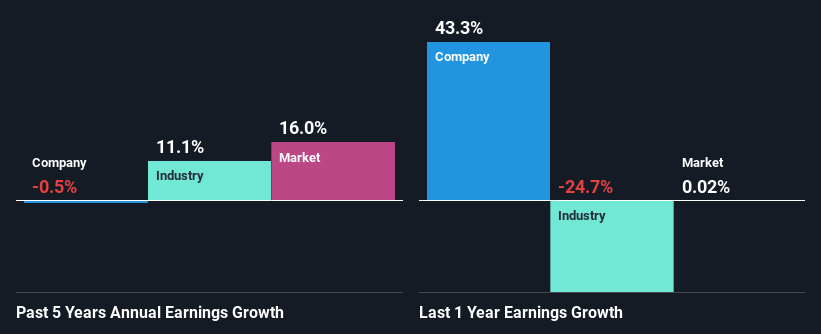FFI Holdings Limited's (ASX:FFI) Stock is Soaring But Financials Seem Inconsistent: Will The Uptrend Continue?
FFI Holdings' (ASX:FFI) stock is up by a considerable 13% over the past three months. However, we decided to pay attention to the company's fundamentals which don't appear to give a clear sign about the company's financial health. Specifically, we decided to study FFI Holdings' ROE in this article.
ROE or return on equity is a useful tool to assess how effectively a company can generate returns on the investment it received from its shareholders. In other words, it is a profitability ratio which measures the rate of return on the capital provided by the company's shareholders.
View our latest analysis for FFI Holdings
How Is ROE Calculated?
The formula for ROE is:
Return on Equity = Net Profit (from continuing operations) ÷ Shareholders' Equity
So, based on the above formula, the ROE for FFI Holdings is:
3.9% = AU$1.7m ÷ AU$44m (Based on the trailing twelve months to June 2023).
The 'return' is the income the business earned over the last year. Another way to think of that is that for every A$1 worth of equity, the company was able to earn A$0.04 in profit.
What Is The Relationship Between ROE And Earnings Growth?
Thus far, we have learned that ROE measures how efficiently a company is generating its profits. We now need to evaluate how much profit the company reinvests or "retains" for future growth which then gives us an idea about the growth potential of the company. Generally speaking, other things being equal, firms with a high return on equity and profit retention, have a higher growth rate than firms that don’t share these attributes.
FFI Holdings' Earnings Growth And 3.9% ROE
It is quite clear that FFI Holdings' ROE is rather low. Even compared to the average industry ROE of 5.3%, the company's ROE is quite dismal. As a result, FFI Holdings' flat earnings over the past five years doesn't come as a surprise given its lower ROE.
Next, on comparing with the industry net income growth, we found that the industry grew its earnings by 11% over the last few years.
Earnings growth is a huge factor in stock valuation. It’s important for an investor to know whether the market has priced in the company's expected earnings growth (or decline). Doing so will help them establish if the stock's future looks promising or ominous. Is FFI Holdings fairly valued compared to other companies? These 3 valuation measures might help you decide.
Is FFI Holdings Using Its Retained Earnings Effectively?
Despite having a moderate three-year median payout ratio of 44% (meaning the company retains56% of profits) in the last three-year period, FFI Holdings' earnings growth was more or les flat. So there could be some other explanation in that regard. For instance, the company's business may be deteriorating.
Moreover, FFI Holdings has been paying dividends for at least ten years or more suggesting that management must have perceived that the shareholders prefer dividends over earnings growth.
Conclusion
In total, we're a bit ambivalent about FFI Holdings' performance. While the company does have a high rate of profit retention, its low rate of return is probably hampering its earnings growth. So far, we've only made a quick discussion around the company's earnings growth. You can do your own research on FFI Holdings and see how it has performed in the past by looking at this FREE detailed graph of past earnings, revenue and cash flows.
Have feedback on this article? Concerned about the content? Get in touch with us directly. Alternatively, email editorial-team (at) simplywallst.com.
This article by Simply Wall St is general in nature. We provide commentary based on historical data and analyst forecasts only using an unbiased methodology and our articles are not intended to be financial advice. It does not constitute a recommendation to buy or sell any stock, and does not take account of your objectives, or your financial situation. We aim to bring you long-term focused analysis driven by fundamental data. Note that our analysis may not factor in the latest price-sensitive company announcements or qualitative material. Simply Wall St has no position in any stocks mentioned.

